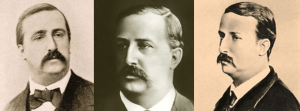
Borodin
Alexander Borodin: String Quartet No. 1, in A Major
Borodin, it turns out, was primarily a chemist and a physician! At age 16, he entered the Academy of Medicine and Surgery at St. Petersburg. He made good progress in all subjects, but eventually decided to pursue a career in chemistry. His chemistry professor, however, was less thrilled with Borodin’s devotion to his two loves, music and chemistry. “Please do not think so much of ballads, when here I am believing in your future and trying to train you to succeed me.” Borodin did not hear the advice of his mentor and greatly excelled in his musical studies, while passing all academic examinations with distinction. In 1856, he was officially appointed assistant to the professor of pathology and therapeutics, and his thesis The analogies between Arsenious Acid and Phosphorous Acid compared the two acids from a chemical and toxicological point of view.
Once Borodin had graduated, he spent a year as a surgeon in a military hospital, followed by three years of post-doctoral studies at Heidelberg and Pisa. In Germany he worked on benzene derivatives, and in Italy on organic halogens. He also met his future wife, the pianist Yekaterina Protopopova, and published a number of scientific papers alongside musical compositions. When he returned to St. Petersburg he took up the chair of chemistry at the Medical-Surgical Academy and simultaneously continued his research and his composing. Amongst various professional squabbles, Borodin managed to make significant contributions to chemistry by co-discovering the “Aldol reaction”—a method of forming carbon-carbon bonds, and he is credited as one of the earliest researches to link high cholesterol with heart disease. He even invented a simple device to measure the amount of urea in animal urine! A notable advocate of women’s rights and fierce proponent of education in Russia, Borodin eventually founded the School of Medicine for Women in St. Petersburg.
Borodin had suffered from poor health all his life. He barely survived a cholera infection in his youth, and suffered several minor heart attacks throughout. During a ball at the Academy on 27 February 1887, Borodin suddenly collapsed from a massive coronary and could not be reanimated. It was suggested that his double occupation of juggling composing with science significantly contributed to his early death. “In winter I can only write music when I am so ill that I don’t give lectures, don’t go to the laboratory,” Borodin writes, “yet all the same can work a little. For this reason my musical friends, contrary to universal custom, always wish me not health, but sickness.”
